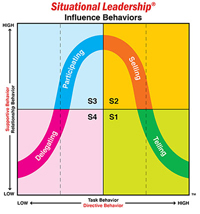
There are various qualities, characteristics and approaches that contribute to being a successful leader. Understanding leadership styles is undoubtedly crucial, providing a valuable foundation for effective leadership, however, the hallmark of an exceptional leader lies in their ability to adapt their style to the situation.
The most accomplished leaders will keenly analyse cues such as the specific task's nature, the dynamics of the group involved and other pertinent factors that contribute to accomplishing objectives. Leaders elevate their effectiveness by wielding this ability to navigate and shift their approach, ensuring a well-suited style that resonates with the situation and fosters optimal outcomes.
In the 1970s, behavioural scientist Paul Hersey and author Ken Blanchard introduced the Situational Leadership® Model, a pivotal framework that has since stood as a pinnacle within the annals of behavioural sciences. This model empowers leaders to decipher the optimal style for any given situation by considering three pivotal facets:

- Task Behaviour: The extent of guidance and direction the leader provides.
- Relationship Behaviour: The degree of socio-emotional support extended to the followers.
- Follower Readiness: The level of readiness exhibited by followers towards a specific task or objective.The Situational Leadership® model equips leaders with a versatile toolkit, allowing them to determine the most fitting style to adopt, whilst accounting for the situation and the readiness of their followers. Four distinct leadership styles are outlined, but it's crucial to keep in mind that these can be applied to different contexts:
Style 1 - Telling: This style comes to the fore when followers are inexperienced and the leader makes decisions and closely supervises execution of the task.
Style 2 - Selling: For situations where followers are willing yet lack the capability to complete a task, the leader assumes a practical stance. They coach and elucidate, guiding followers towards the ideal path to task completion.
Style 3 - Participating: Adopting this style is advocated in scenarios where followers are competent but show signs of hesitancy or insecurity. Encouraging participation, the leader encourages them to complete the task by fostering a supportive environment.
Style 4 - Delegating: When the leader feels confident the follower has the ability and willingness to complete a task, delegation becomes the apt choice. Suited for seasoned employees with self-established processes, this style empowers them to accomplish tasks independently.
The four styles of Situational Leadership® provide a valuable framework to navigate any situation, but the essence of exceptional leadership lies in your ability to adapt based on the prevailing circumstances.
Adaptability Accelerates Successful Outcomes
When you can recognise the importance of contextualising your approach, no two situations are ever the same, and can result in the following benefits:
- Enhanced Productivity: By tailoring your leadership style to the diverse needs of your team members, you can create a supportive environment. By making them feel more comfortable, you can positively impact workplace productivity.
- Trust and Relationships: Through active listening and effective communication, leaders build trust within their relationships, and can shift their approach to identify and address unique challenges.
- Elevated Performance: The varied support offered in sync with individual needs heightens morale, instils confidence, and propels team members to unlock their full potential, ultimately elevating overall organisational performance.
- Adapting to Change: In the face of shifting demands, adaptive leaders retain focus and navigate uncertainty while upholding overarching objectives, thus ensuring momentum as they lead through periods of change, volatility and uncertainty.
- Employee Retention: With an agile leadership approach, you can foster effective communication and team cohesion. By encouraging a sense of belonging, you can minimise turnover and nurture a happy, productive and stable workforce.
As aptly stated by Paul Hersey:
“It is not enough to describe your leadership style or indicate your intentions. A Situational Leader assesses the performance of others and takes the responsibility for making things happen.”
If you’re eager to grow as a leader and inspire your team to success, you can discover our Situational Leadership® Training Accreditation Programmes here. For further information or advice, please contact our friendly training experts on 01252 618 400 or email theteam@gbscorporate.com.
Situational Leadership® and Performance Readiness® are registered trademarks of Leadership Studies, Inc. dba The Center for Leadership Studies. Copyright ©2015, Leadership Studies, Inc. All Rights Reserved.






